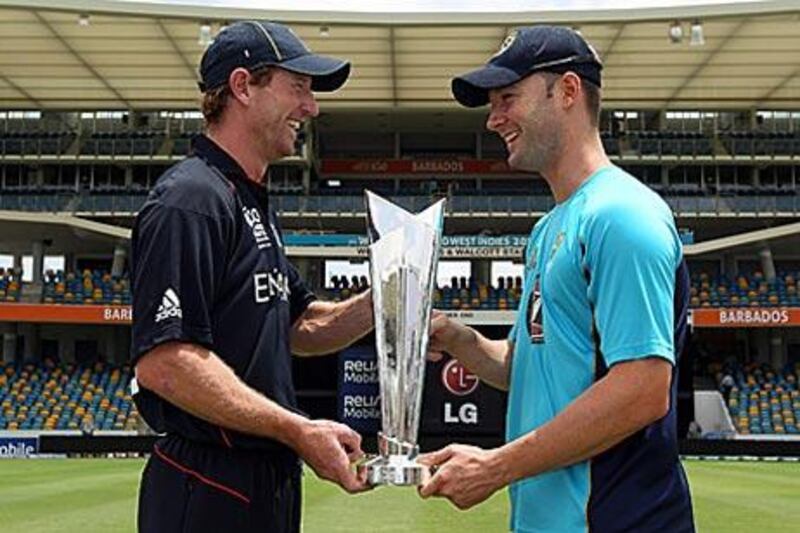With the bat, Michael Clarke has not yet come to the party. A poor return of 65 runs from five innings, at a strike rate of 74, has started a debate in his homeland about his place in the Twenty20 side.
But as Brad Haddin pointed out, his value goes beyond the runs Clarke scores and that perhaps is a reason why Australia have not lost a Twenty20 game since he replaced Ricky Ponting as captain. Clarke has an inherent ability to lift his side, give confidence to his men and inspire them to do "the little things" better than their opponents. Paul Collingwood, like his counterpart, has been going through a lean patch with only 49 runs from six innings. But no one dares to mention those figures, for they know he is the man to bet on when all seems lost for his side.
The confidence his dogged quality brings to the rest of the squad is immeasurable. Besides, just his presence on the field is uplifting; Collingwood is always in the thick of the action, diving around and taking catches. As they say, he is one to lead from the front and is as brave as they come.
Australia probably have the edge in the batting stakes, with Shane Watson and David Warner opening the innings, and David Hussey and Cameron White to follow. Michael Hussey coming in at No 7 is their safety valve, giving earlier batsmen a licence to go all out. The worry for opposing bowling attacks, though, does not end there. Mitchell Johnson, who boasts a Test century, lines up at No 9, giving Australia arguably the longest batting line-up of any team. Kevin Pietersen has dominated the headlines, but England have hardly been a one-man wrecking unit. Michael Lumb and Craig Kieswetter have given the side healthy starts in virtually every game.
Their opening stands have produced 200 runs in six games, which is five short of Warner-Watson's rate. Eoin Morgan has been the most audacious batsman of the tournament and Luke Wright has made valuable contributions. Pietersen, though, will be the wicket Australia will target when England bat.
England probably just edge this sector. They have a lot more variety than Australia and a bit more control. Ryan Sidebottom, Stuart Broad and Tim Bresnan have kept things tight with the new ball, while Graeme Swann and Michael Yardy have squeezed batsmen further with spin and kept their opponents scoring rates down. The highest total they have conceded is 149. If they can do the same against Australia, it will be a job well done. Australia on the other hand have played five of their six games against teams from the subcontinent and used scorching pace to unsettle them. That strategy, however, might not work as well with England. Shaun Tait, Dirk Nannes and Mitchell Johnson - with 31 wickets between them - will have to find a few more tricks to bother Pietersen and the English top order.
Australia showed their desperate will to win in their astonishing last-gasp win over Pakistan in the semi-finals when they looked to be down and out, Hussey's three sixes and a four in the final over carrying them through by three wickets. The result was even more impressive for the fact they had been hardly tested in winning all their previous games before the last four. England were unfortunate to lose to the West Indies by the Duckworth & Lewis method in their opening game after posting 191 for five, their highest score in the tournament.
Since then they have improved steadily and this has been comfortably their best performance in Twenty20. Australia have more experience in big match scenarios following their dominance of 50 over cricket and will start as slight favourites, but the form England are in means they are unlikely to be intimidated by their old rivals today in Barbados.
arizvi@thenational.ae
Australia v England, 7.30pm, CricOne





